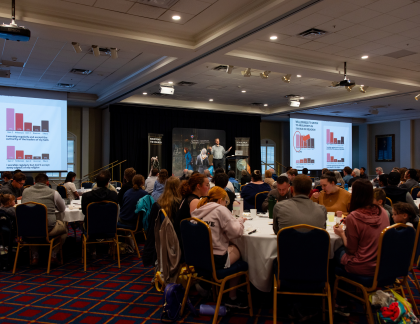This April, the Jenkins Center for the Christian Understanding of Islam welcomed Dr. David Wood, a well-known Christian apologist and content creator whose YouTube videos have impacted millions. Once a staunch atheist, Wood encountered Christ in prison after a challenge led him to investigate the evidence for Christianity. After his release, he earned a PhD in Philosophy from Fordham University and has since participated in over a hundred public debates with Muslims, atheists, and Christians alike.
The evening began with a heartfelt prayer over the meal, setting the tone for what would become a powerful time of fellowship and inspiration. Dr. Ibrahim introduced the vision and mission of the Jenkins Center—a center committed to engaging Muslims with the love and truth of Jesus Christ in the hope of leading them to saving faith.
As he began his lecture, Wood shared his insights on the growing interest in Islam. He also debunked myths about the rise of Islam and atheism. Turning to Islam, he described the current wave of apostasy within the Muslim world. Nations like Iran are seeing growing numbers leave Islam, causing a crisis of faith among some Muslim communities. Attempts to revive religious zeal through the Caliphate movement have failed to satisfy the longing for spiritual truth and blessings from Allah.
Wood shared touching memories of his late friend Nabeel Qureshi, a former Muslim who came to faith in Christ after years of spiritual searching and rigorous debate with Wood. Their friendship and theological discussions spanned over four years, focusing first on the historical and philosophical foundations of Christianity. Then, God providentially prepared the way for Wood to present Christ with boldness. This resulted in Qureshi coming to saving faith in Jesus Christ.
One profound takeaway was Qureshi’s conflicting confidence as he acknowledged the strength of Christian evidence yet still believed Islam to be 100% true. Wood emphasized that many Muslims possess a false sense of certainty, often rooted in scientific or mathematical claims, and that Christian criticism is essential in helping them question these assumptions.
Wood outlined a four-step method for meaningful conversations with Muslims:
- Open the door.
Most Muslims welcome the chance to discuss their faith, particularly in light of negative portrayals in the media. - Ask “What?” questions.
Begin by asking what they believe about God, Jesus, Islam, and Muhammad to understand their views. - Turn to “Why?” questions.
Ask them why they believe these claims. Understanding why they believe what they do is key. This creates space for deeper discussions. - Learn as you go.
Build trust through ongoing conversations, tackling different questions over time.
He encouraged believers not to attack but to invite curiosity and mutual exploration. For example, sharing stories like Muhammad’s relationship with Ayesha (whom he married when she was a little girl) can be used to highlight contrasting moral standards without aggression.
Wood then explained the difference between Apologetics and Polemics:
1. Apologetics (1 Peter 3:15)
Providing reasoned defenses of the Christian faith.
Common Muslim objections include: “Where did Jesus say, ‘I am God, worship Me’?”; “How can God die?”; and “The Bible has been corrupted.”
He pointed to Quranic references that affirm the inspiration of Jewish and Christian scriptures (Quran 3:3–4; 7:157; 5:47; 5:68; 10:94). He also drew comparisons between verses like Surah 57:3 and Revelation 1:17–18 to demonstrate how attributes ascribed to Allah are also found in Jesus.
2. Polemics (2 Corinthians 10:3–5)
Challenging flawed arguments of opposing worldviews.
Debunked Islamic claims include: “The Quran has been perfectly preserved”; “The Quran contains scientific miracles”; and “Muhammad is prophesied in the Bible.”
Wood took a few questions from the participants before the event concluded. This evening was more than a talk—it was a call to action, a reminder that dialogue, love, and truth can lead hearts from doubt to faith, from confusion to clarity, and ultimately, from death to life in Christ. The participants were motivated and encouraged to take the gospel to the lost.

